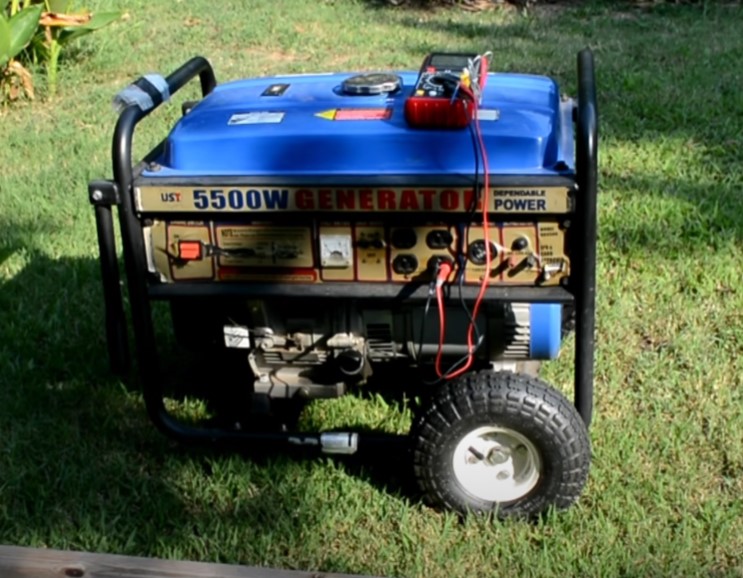A generator, designed to convert mechanical energy into electrical energy, provides power during outages, camping trips, or construction sites. For optimal operation, it is important to keep generators dry. Exposure to water can be detrimental to their performance and lifespan.
Is it okay if a generator gets wet?
No, it is not okay for a generator to get wet. Exposure to water or even excessive moisture can cause significant problems for a generator. Here are a few reasons why a wet generator can be problematic:
- Electrical Short Circuits: Water, especially impure water, is a good conductor of electricity. If water gets into a generator, it can create a path for electricity that leads to short-circuiting. This can damage the generator and may also pose a risk of electrocution.
- Corrosion and Rust: Water and moisture can cause metal components inside the generator to rust and corrode over time. This can degrade the generator’s performance and reduce its lifespan.
- Fuel Contamination: If water gets into the fuel tank, it can contaminate the fuel, leading to problems with the generator’s engine.
- Fire Hazard: In certain situations, water causing a short circuit can lead to a fire, which poses a significant safety hazard.
- Personal Safety: Besides causing damage to the generator, a wet generator poses a risk to personal safety, mainly through the risk of electric shock.
To keep your generator safe and functioning properly, keep it in a dry, well-ventilated area and take precautions to protect it from the elements, especially in inclement weather.
Regular maintenance and inspections can help detect any signs of water damage early, allowing you to address them before they lead to significant problems.
Dangers of a Wet Generator
The threats posed by water exposure to a generator are manifold:
- Water can cause electrical shorts and surges, resulting in erratic operation or a total breakdown in the worst-case scenario.
- Moisture accelerates the corrosion and rusting process, which can damage vital parts over time. The fuel system is not exempt either; water can contaminate the fuel, causing engine problems.
- A wet generator can lead to personal injury through electrocution or property damage through fire caused by short circuits.
What Happens When a Generator Gets Wet?
Immediate effects
The immediate impact of water on a generator is typically a short circuit. This is because water, especially when it contains impurities, is a decent conductor of electricity.
Suppose it penetrates the electrical parts of the generator. In that case, it can lead to short circuits, causing the generator to shut down unexpectedly or fail completely.
Long-term effects
Prolonged exposure to water or moisture can lead to corrosion of internal components, particularly metal ones. This, in turn, shortens the generator’s lifespan and compromises its efficiency and performance.
Identifying a Wet Generator
Recognizing that a generator has been exposed to water is crucial to preventing further damage. The most obvious sign is visible water intrusion. However, a change in the generator’s performance, such as an unexpected shutdown or fluctuating power output, can also indicate water damage. Additionally, unusual noises or smoke are signs of serious issues, possibly caused by water penetration.

What to Do if a Generator Gets Wet?
If your generator gets wet, it’s crucial to act quickly to minimize potential damage and safety hazards. Here are the steps you should follow:
- Turn off and unplug the generator: The first and most important step is to shut it down and unplug it from any connected devices. This will reduce the risk of electrical shocks or short circuits.
- Avoid touching the generator: If the generator is still wet and connected to a power source, electrocution’s risky. Please do not touch the generator until it’s safely unplugged and switched off.
- Inspect the damage: Once it’s safe, inspect the generator to assess the extent of the damage. Look for signs of water intrusion, such as pooled water or moisture on the exterior or interior, and signs of possible short circuits, like burn marks or a strong electrical smell.
- Dry the exterior: Use a dry towel or a blower to dry the generator’s exterior. Be careful not to force water into the internal parts while doing this.
- Contact a professional: For drying the internal components, it’s recommended to contact a professional. This is important because the internal parts of a generator are complex, and improperly handling them could lead to more harm than good. Furthermore, some components may need to be replaced entirely if they have been damaged by water.
- Please wait for the generator to dry completely: After it dries inside and out, give it ample time to air dry before turning it on again. This ensures any residual moisture evaporates.
- Test the generator: Once you’re confident the generator is completely dry, attempt to start it up. If it’s not working properly or making strange noises or emitting strange smells, shut it off immediately and contact a professional.
- Prevent future incidents: Finally, consider taking steps to prevent your generator from getting wet in the future. This might include moving the generator to a covered, raised area or investing in a specially-designed generator cover or enclosure.
Remember, safety is paramount. If your generator gets wet, always prioritize personal safety. Feel free to call a professional if you need clarification on any steps in the process.
Preventing a Generator From Getting Wet
Proper preventive measures can shield your generator from water damage. Always store and position your generator in a dry, elevated location away from possible water exposure.
Using generator covers and enclosures during rainy weather can protect it from getting wet. Regular maintenance and inspections can also help in the early detection and prevention of potential water-related issues.
Special attention should be given to generator use during extreme weather conditions.
The generator got wet and won’t start
If your generator gets wet and won’t start, it could be due to various issues, including electrical short circuits, contamination of the fuel system, or damage to the ignition system. Here are the steps you should take:
- Safety First: Ensure the generator is disconnected from any power sources or appliances. Do not touch it if it’s still wet, as there could be a risk of electrical shock.
- Inspect the Damage: Check the generator for visible signs of water intrusion. Look for signs of corrosion, burn marks, or a strong electrical smell that might indicate a short circuit.
- Dry the Generator: Dry the exterior with a towel or a blower, careful not to push water into the interior parts. For internal components, it’s best to contact a professional. They have the expertise to dry the components without causing further damage.
- Consult a Professional: If your generator still won’t start after it’s completely dry, it’s time to consult a professional. They can diagnose the problem and repair or replace the necessary parts. The issue might be due to water damage to the electrical system, fuel contamination, or other mechanical problems.
- Regular Maintenance: Once your generator is back up and running, consider regular maintenance checks to ensure it remains in good working condition. This could prevent similar issues in the future.
- Prevention: Take steps to protect your generator from getting wet again. This might include moving it to a covered location, using a generator cover or enclosure, and never running it in the rain or a flood-prone area.
Remember, a generator is a complex piece of machinery. Suppose it gets wet and won’t start. In that case, it’s usually best to consult a professional rather than trying to fix it yourself, as you could inadvertently cause more damage.
Conclusion
Keeping your generator dry is paramount for its longevity and efficient performance. Should your generator get wet, immediate and appropriate actions can mitigate the damage. However, prevention is always the best course of action. Regular maintenance, careful storage, and protective covers are some ways to ensure your generator stays dry and functional for years to come.
Also Read:
- Troubleshooting Common Westinghouse Generator Problems
- Generator Not Producing Power (Reasons & Solution)
- How to Store Portable Generator? (Short & Long Term)
- Generac Generator Turns on Randomly (Cause & Solution)
Recent Posts
Yes, synthetic oil can generally be used in generators. It offers superior lubrication, improved resistance to temperature variations, and longevity compared to conventional oil, which can enhance...
In today's digital age, our dependency on computers and other electronic devices is undeniable. But what happens when a power outage occurs? This is where generators come in. However, is it safe to...
